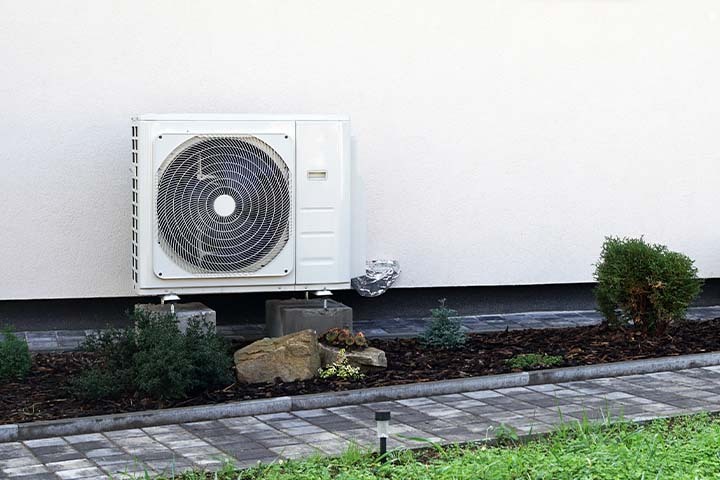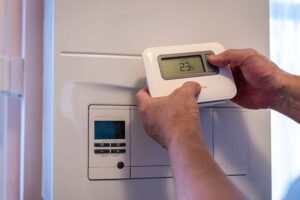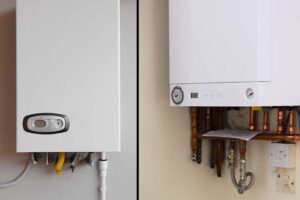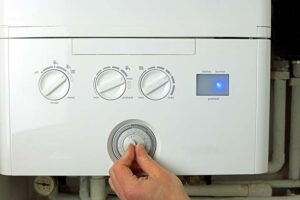Heating our homes costs a lot, and it’s a large component of our bills. In the whole of Europe, 130 million households heat using gas. It accounts for nearly 40% of the whole of the gas that is used, and it produces more than a fifth of the greenhouse gases of all of Europe
As bills go up, UK households question whether switching to something greener means an air source heat pump costing a fortune.
The truth is that these systems aren’t as expensive to run as older boilers, particularly if you take advantage of government grants. Let’s make it straightforward, so you can check if it’s worthwhile changing.
Heat Pumps Run on Electricity, Not Gas
Air-source heat pumps don’t burn gas like boilers. They’re powered by electricity. So, no burning of fossil fuels, and no emissions of carbon in the home. But as they’re powered by electricity, people assume they cost more to power.
Yes, electricity is more costly per unit compared to gas, but heat pumps are 300% more efficient than a standard gas boiler. They require less energy in order to heat your house. So they consume more expensive electricity, but they waste a lot less, and that can indeed make your bills lower in the long term.
Electricity and Gas Unit Prices and Standing Charges (1 April to 30 June 2025)
According to Ofgem, the energy regulator in the UK, electricity is more expensive than gas when you compare them unit by unit.
Here’s what you’ll pay from 1 April to 30 June 2025:
- Electricity: 27.03p per kWh
- Electricity standing charge: 53.80p per day
- Gas: 6.99p per kWh
- Gas standing charge: 32.67p per day
So, yes, electricity is around four times more expensive than gas per unit. But remember — heat pumps are highly efficient. While a gas boiler wastes a lot of energy, a good heat pump gives you up to three or four units of heat for every one unit of electricity it uses.
Heat Pump Running Cost UK 2025
On average, a medium-sized UK home needs around 11,500 kWh of energy each year to stay warm – that’s the typical amount Ofgem uses when looking at household heating.
Now, if you’ve got an air source heat pump that runs well (with a Seasonal Coefficient of Performance, or SCOP, of 3.6), it means the system is quite efficient. In simple terms, for every unit of electricity it uses, it gives you about 3.6 units of heat.
Most of that heating (about 80%) happens between October and March — the colder months. Based on current electricity prices (27.03p per kWh), your yearly running cost for a heat pump would likely fall between £840 and £2,280, or around £70 to £190 a month.
That’s about the same as a decent gas boiler — and even cheaper if you’re replacing an old, clunky system running on oil or outdated gas.
How Much Electricity Does a Heat Pump Use Per Month UK
Let’s say your heat pump runs with a SCOP of 3.6 — that means for every 1 unit of electricity, you get 3.6 units of heat. So, if your home needs 11,500 kWh of heat per year, your heat pump would only need about 3,200 kWh of electricity to do the job.
That works out to about 266 kWh per month on average, but more like 430–500 kWh during winter months when your heating’s on more often. At the current electricity rate of 27.03p per kWh, that’s around £70 to £190 a month in winter, which is often cheaper than running an older gas or oil boiler.
Air Source Heat Pump Running Cost vs Oil Boiler
Oil boilers used to be common in homes without access to mains gas, but they’re not always cheap to run. The price of heating oil can go up and down quickly, even day by day. Over the past year, oil has ranged from 55p to 67p per litre, which really adds up over time.
An air source heat pump, on the other hand, runs on electricity, and its running costs are usually more stable. Even compared to a modern, efficient oil boiler, a heat pump can be cheaper to run. Plus, you don’t need to worry about oil deliveries or topping up your tank in winter.
Air Source Heat Pump Running Cost vs LPG Boiler
LPG boilers are another option for homes without mains gas, but they’re not the most efficient, especially older models. Many LPG boilers run at only 70% efficiency, which means a lot of the energy is wasted.
Right now, LPG costs around 55p per litre, but that can change quickly, especially when gas prices spike. Air source heat pumps are far more efficient, converting much more of the energy they use into actual heat. So even though electricity costs more per unit, you’re getting much more out of every kWh.
Air Source Heat Pump Running Cost vs Gas Boiler
Gas is still cheaper per unit than electricity — 6.99p per kWh for gas vs 27.4p for electricity — but that’s not the full picture. Heat pumps are over three times as efficient as gas boilers, so they can still work out cheaper to run in the long run.
Plus, if you switch to a heat pump, you could save around £119 a year by cutting out the gas standing charge completely. And with the government considering changes to how taxes are added to energy bills, electricity may get even cheaper compared to gas in the future.
All in all, while gas might seem cheaper upfront, a heat pump can actually help lower your energy bills, especially over time.
Recent Research on Heat Pumps’ Running Cost
According to experts, if your heat pump has a Seasonal Coefficient of Performance (SCoP) of 3 or higher, its running cost is similar to an 85% efficient gas boiler. If your heat pump hits a SCoP of 3.2, it matches the cost of a top-rated 90% efficient gas boiler.
So, How Do UK Heat Pumps Actually Perform?
A recent study by Energy Systems Catapult – an independent, government-backed organization – looked at 750 UK homes and found the average SCoP was 2.9. That means heat pumps currently cost just a little bit more to run than a brand-new gas boiler.
But here’s the silver lining: the Energy Saving Trust found that while running a heat pump might cost around £14 more per year compared to a new A-rated gas boiler, you’d still save about £340 per year if you’re switching from an older, less efficient G-rated boiler.
And there’s even more good news — some installers report SCoPs as high as 4, even in older homes. That means even better performance and bigger savings are definitely possible with the right setup.
Pair Your Heat Pump with Solar Panels
Want to cut your running costs even more? Pair your heat pump with solar panels.
This means you’ll be generating your own electricity during the day, cutting down how much energy you need to buy from the grid. Over time, this can seriously reduce your energy bills, especially in spring and summer when your panels are working their hardest.
And here’s the best bit: If you qualify for the ECO4 scheme, you may be able to get both an air source heat pump and solar panels installed completely free. No upfront cost, no stress — just lower bills and a warmer, greener home.
This combo can make a huge difference to your yearly savings and help protect you from rising energy prices.
Free solar panels + efficient heating = major savings.
What Affects the Running Cost of a Heat Pump?
The cost of running a heat pump isn’t the same for everyone. It depends on your home, your old heating system, how you use energy, and even the tariff you’re on.
1. What Are You Switching From?
If you’re moving from an old, inefficient oil or gas boiler, your savings could be quite big. But if your current boiler is fairly new and efficient, the difference might be smaller.
2. Is Your Home Well Insulated?
This is a big one. The better your insulation, the cheaper it’ll be to run your heat pump. That includes:
- Loft and wall insulation
- Modern windows and doors
- A well-sealed roof and floor
If your home leaks heat, your heat pump will need to work overtime – and that means higher bills. So it’s a good idea to improve insulation before or alongside getting a heat pump.
3. Size of Your Home (and People in It)
Bigger properties require more energy to warm up – it’s that straightforward. A little 2-bedroom flat is cheaper to warm up than a large 4-bedroom detached house.
Also, if you have a great number of people using hot water, or a high number of radiators, that does make the air source heat pump work harder.
4. How Efficient is Your Heat Pump?
Heat pumps have a measure known as a Coefficient of Performance (COP) – this is how many units of heat it puts out per unit of electricity that it consumes.
The majority of air source heat pumps used in the UK have a COP of 3-4. For each 1 unit of electricity, they supply 3-4 units of heat. However, the COP reduces when the weather is extremely cold, and running them becomes more costly during winter.
5. What Kind of Radiators Do You Have?
Heat pumps perform well with large, new radiators or underfloor systems. That’s because they warm your house more that way and more steadily too, compared with a gas boiler that blasts high heat.
If the radiators you already have are small or obsolete, they might not heat your house effectively with a heat pump. To reduce your running costs in the long run, you should consider upgrading them.
6. Your Electricity Tariff
Heat pumps run on electricity, so the running cost is based on how much you pay for electricity.
You may pay more if you’re on a standard tariff. But if you change to a time-of-use or off-peak tariff, you’ll save by using your heat pump during cheaper times of the day (typically late night or early morning).
So, Are Heat Pumps Really Expensive to Run?
Not really, if your system is properly set up. Heat pumps really do pay for themselves in the long run, particularly when you’re upgrading from an outdated oil, LPG, or electric system.
The trick is efficiency; if you’ve got a well-insulated house and the heat pump is properly installed, the cost of running it is really low.
In addition to that, the government ECO4 scheme includes free air source heat pump grants towards the cost of the switch, which brings the savings sooner.
Heat pumps might become even more economical to use in the future. The UK government is considering how it might make electricity cheaper. Doing that would make heat pumps potentially the cheapest way to warm your house.
Thus, your electricity bill may go up slightly, but your gas bill will essentially fall to zero, and throughout the year, most people end up saving more over time.
Frequently Asked Questions
Typically, you pay between £840 and £2,280 annually based on the size of your property, how well insulated it is, and how efficiently the system is operating.
It might be due to the poor installation, inadequate insulation, or running it with inefficient settings, such as being turned on and off all the time. Costs inevitably go up during winter, but across the course of a year, heat pumps end up costing less than older systems.
Yes, particularly in the long term. They’re lower-maintenance, more energy-efficient, and cost less, especially if you’re converting from oil or electric heat.








